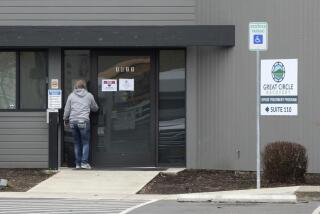CAMPAIGN ’96 : Oregon’s New Senator Credits Environmental Vote for Victory
- Share via
PORTLAND, Ore. — A few days before his election Tuesday as Oregon’s new U.S. senator, Ron Wyden was recalling a vote in Congress last year on a plan to open up federal forests to salvage logging of dead and dying trees. Both of Oregon’s Republican senators had voted to quash a move by Sen. Patty Murray (D-Wash.) to stop the logging, and her effort, backed by environmentalists, narrowly lost.
The result was the first wide-scale logging in Oregon forests in several years. Protests erupted; police were called out; nearly 200 demonstrators were arrested.
“I called up Sen. Murray the other day,” Wyden, a 15-year veteran of the House, recounted. “You know, she was one vote short . . . and I said, ‘Senator, I’m going to be your vote.’ ”
Wyden, 46, believes that it was issues such as clean air, clean water and forest protection that resonated most with Oregon voters and were key to his razor-thin win over Republican state Sen. Gordon Smith--a victory that gave an important boost to the national Democratic Party at the start of the 1996 election season.
“This was a race about Oregon values, but it does, in my view, have clear national implications. I think this sends a very clear wake-up call to the Congress on environmental issues,” Wyden said at a news conference Wednesday.
Leaders of the Sierra Club and the League of Conservation Voters--groups that combined in an independent campaign effort on Wyden’s behalf--joined in celebrating the outcome of the special election to replace Republican Bob Packwood, who resigned last fall in the face of sexual-harassment charges.
“The environment made a difference,” said Daniel Weiss, a Sierra Club official based in Washington, D.C. Noting that Wyden won by barely more than 17,000 votes out of more than 1.1 million cast, Weiss said a get-out-the-vote effort by the two environmental groups was especially crucial.
Abortion-rights and organized-labor groups also claimed part of the credit for the election of Oregon’s first Democratic senator since 1962.
The win narrows GOP control of the Senate to 53 to 47 and, Democratic leaders said, shows that their party can mount a successful campaign fought in the controversial arenas of abortion, environmental regulation, Medicare cuts and tax reform.
Sen. Bob Kerrey (D-Neb.), head of the Democratic Senatorial Campaign Committee, hailed Wyden’s victory as the party’s first step toward regaining the Senate majority it lost in the 1994 elections.
Wyden’s victory, Kerrey said, “signals a repudiation of the Republican majority.”
But Republican National Committee Chairman Haley Barbour insisted that the closeness of the election--which in the immediate aftermath of Packwood’s resignation had been viewed as a prime Democratic opportunity--was a testament to “the strength of the conservative ideas [Smith] espoused.”
Along with the political stakes involved, the election gained attention because it was the first to use mail-in balloting in a major contest. Registered voters received their ballots in early January and responded with a turnout of almost 66%--a record for a special election in Oregon.
Some Oregon officials plan to push for the state to adopt the mail-in process for all its elections.
In analyzing his defeat, Smith said Wednesday he was handicapped both by his origins in eastern Oregon--the state has not elected a senator from that region since the 1920s--and the fact that he is a businessman.
“In some ways, it was a referendum on that--whether a person in business can get elected to statewide office,” said Smith, who owns a frozen-food factory.
Smith, who as state Senate president has compiled one of the Legislature’s most conservative voting records, won 27 of the state’s counties to Wyden’s nine. But his strong support in rural Oregon’s logging and farming communities wasn’t enough to overcome Wyden’s huge showing in the metropolitan Portland area and his narrow victory in the moderate suburbs outside the city.
The Sierra Club made Smith its first target in a national campaign to defeat what it calls anti-environment candidates. The group joined with the League of Conservation Voters to spend some $200,000 developing TV ads about pollution problems at Smith’s factory and to organize the get-out-the-vote effort.
The groups identified more than 100,000 voters with environmental sympathies in Portland and its suburbs, then deluged them with postcards, ads and telephone calls until they voted.
More to Read
Sign up for Essential California
The most important California stories and recommendations in your inbox every morning.
You may occasionally receive promotional content from the Los Angeles Times.












